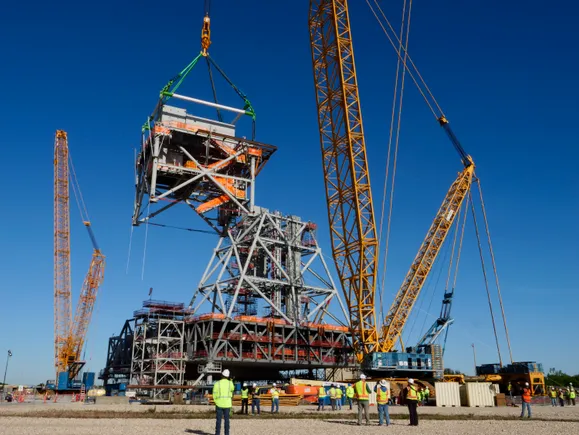Bechtel’s $1.3 billion launch pad project for NASA is one step closer to completion after a series of delays.
The Reston, Virginia-based contractor announced that it successfully lifted and placed the first tower module, Tower Module 4, on the space agency’s Mobile Launcher 2 project at the Kennedy Space Center in Florida, according to a Jan. 6 news release.
But the company’s announcement came after an August 2024 report from NASA’s Office of Inspector General that detailed repeated extensions of the project’s timeline and budget and placed much of the blame on Bechtel. The document followed a previous audit the OIG conducted in June 2022.
Ballooning costs
The report pins the original ML2 contract, awarded to Bechtel in June 2019, at $383 million, with scheduled completion by March 2023.
Once the structure is complete, it will be integral to NASA’s mission to return humans to the Moon via its Artemis program, with a focus on Artemis IV, which will send astronauts to live in the first lunar space station, known as Gateway.
After delays during the COVID-19 pandemic, NASA estimated in December 2023 that the contract had grown to $1.3 billion, with completion pushed out to November 2026, according to the document. Then in June 2024, the agency told Congress that total project costs — not just Bechtel’s portion of the contract — would be $1.8 billion, with completion delayed until September 2027.
The Inspector General concluded in its report that the project is now likely to exceed $2.7 billion — with $2.5 billion going to Bechtel — more than three times the project’s initial total estimate. It also projected that completion of the build won’t come until 2029, after the current Artemis IV launch date of September 2028.
“Our projections are based on the substantial cost growth that the Bechtel contract has incurred over the last 3 years, past performance issues observed during design with the production of detailed drawings for steel fabrication and management of the launcher’s weight, and the significant amount of construction work that remains,” the OIG wrote.
Different timelines
However, Bechtel forecasts a completion date of November 2026, while NASA said in a response to a draft report that it expects the project to be finished by 2027.
The OIG acknowledged that NASA officials took issue with some of its conclusions.
In response to a July draft of the final report, NASA’s Exploration Systems Development Mission Directorate said, “ESDMD disagrees with the OIG-projected ML2 cost estimate of $2.7 billion. Simply using a straight-line extrapolation, as the OIG did, does not accurately reflect the current development situation.”
The same document praised Bechtel’s work at another point, stating, “Recently, Bechtel completed a critical integration milestone two weeks ahead of schedule, marking a critical advancement in its construction and assembly capabilities within the Artemis Campaign.”
Project history
Bechtel began construction of the launch site in August 2023. It responded to the OIG report on Sept. 26, 2024, where it noted that the project’s completion date has remained unchanged for the last two years. It also said that it was inaccurate to attribute all $594 million of contract delays to Bechtel’s performance, alongside what Bechtel claims are several other factual errors.
“The cost increases and schedule delays since the start of the ML2 project have been multi-faceted, resulting from changes to the contract — both directed and circumstantial (ex. COVID-19 impacts and weather-related delays) — as well as impacts related to [Bechtel National Inc.’s] performance,” Bechtel said in the response.
The company told Construction Dive in an emailed statement that it found the report deeply disappointing, and that it has approached the project with safety in mind.
“While we understand that the OIG is charged with issuing its view of NASA’s and Bechtel’s progress relative to cost and schedule, our overriding commitment remains on delivering a safe and high-quality product,” the statement said.

